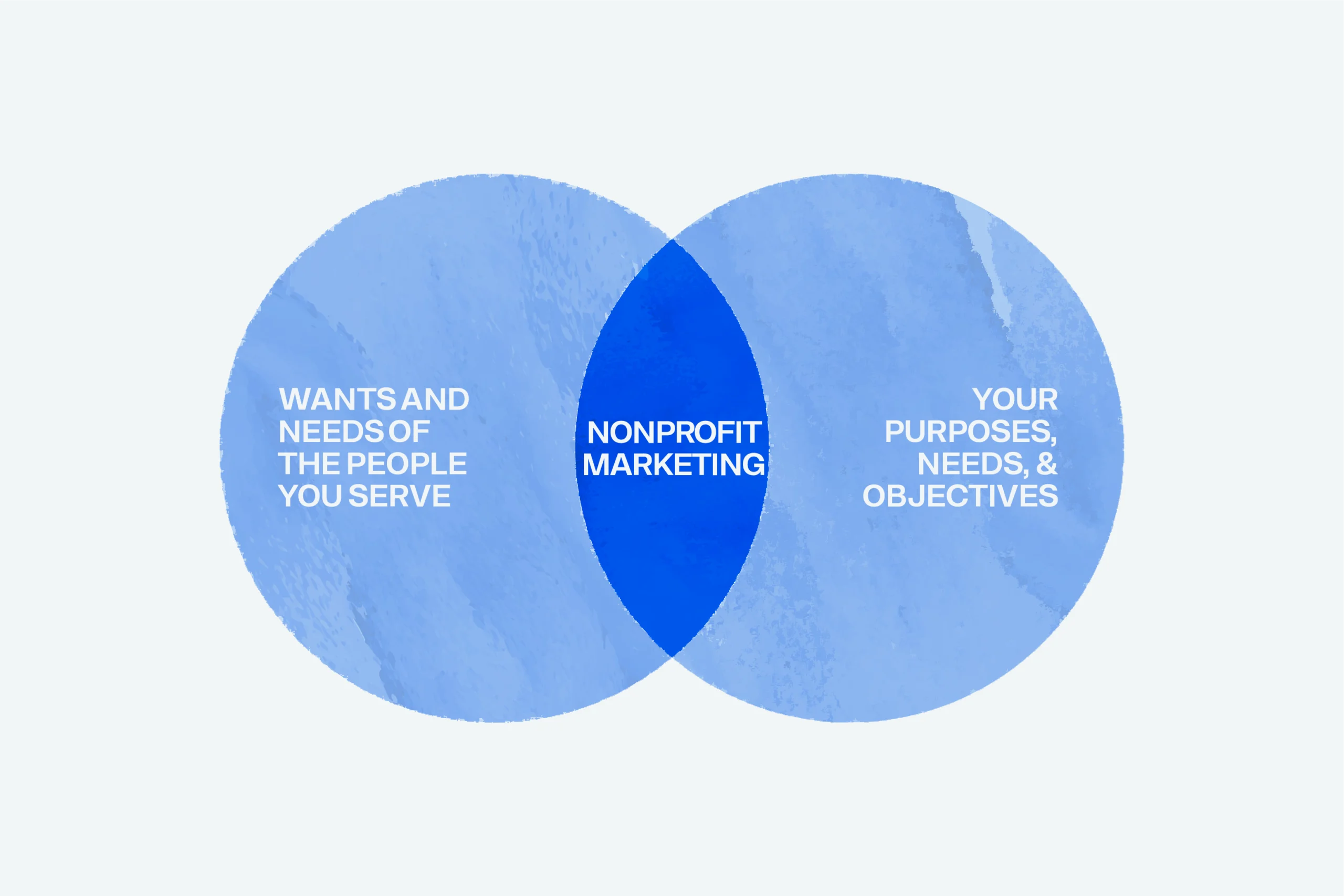
Let’s Talk About Nonprofit Marketing
“When your organization’s purpose and your audience’s needs are in harmony, marketing is never about pushing products, consumerism, manipulation, or spam. It’s about trust.”
Amelia Gray
The world of nonprofits isn’t exactly the most lucrative or “successful” work—at least by common monetary standards—but, in our experience, the mission-driven aren’t too concerned about that. If you’re part of a nonprofit, our guess is that your mission is what drives you. Ever find yourself talking about it with your friend, your mom’s second cousin’s employer, or the person stuck next to you in the return line at Costco? We’ve all been there. And, while we don’t doubt that you want to get the word out about your organization, nonprofit marketing comes with its own challenges.
Because of this, a lot of organizations pinch pennies—as well as time and resources—when it comes to marketing themselves. Some may be blind to the reality that not everyone sees their organization’s role as important. Others aren’t sure which channels to use to be effective. Many nonprofits and faith-based organizations even feel that marketing compromises their values or mission. We’re a creative team that specializes in nonprofit marketing, so it’s probably no surprise that we’re ready and willing to talk about it.
NONPROFIT MARKETING—A DEFINITION
One of the reasons the idea of marketing can be so confusing is that people mean many different things when they use the word “marketing.” How many different things? Well, at least 72 because marketer Heidi Cohen lists 72 different definitions in this article. No wonder we’re all confused!
Instead of 72 definitions, we’ll give you one simple one. It’s been around for a while, but it’s one that guides our work and values. (And, if you’ve been keeping up with our blog, you may have heard it before.) In an interview with Peter Drucker, marketing expert Phillip Kotler says, “Marketing is the way to harmonize the needs and wants of the outside world with the purposes and resources and objectives of the institution.” (Drucker, 1990, p. 84)

Almost every instance of unethical or unwanted marketing exists when an organization’s purposes aren’t harmonized with your wants and needs as a consumer. Feeling misled by that personal care product that found you on your Instagram feed? Find yourself trying to ward off acquaintances selling fancy knives or protein shakes? Does your email’s unsubscribe button sometimes seem like it’s broken?
When your organization’s purpose and your audience’s needs are in harmony, marketing is never about pushing products, consumerism, manipulation, or spam. It’s about trust. On our team, we start with trust because we believe it’s the glue of our relationships. We cultivate trust with our clients and their audiences by listening wholeheartedly, communicating clearly, and leading proactively. When it comes to nonprofit marketing and working with mission-driven organizations, our team has found that advocating for a proper view of marketing—one that starts with trust—is the first step.
WHY NONPROFIT MARKETING?
Hopefully we’ve cleared up some misconceptions about nonprofit marketing. But, if you’re a nonprofit leader or part of a mission-minded organization, you might still be wondering if marketing yourself is really a necessity. Let’s talk about it.
It tells (and reminds) people that you exist
When it comes to for-profit organizations, you’d have a tough time finding business leaders who didn’t believe in marketing their product or service to new people. Why do many charitable or faith-based organizations have a tough time with that idea? Maybe you only serve a local community, or maybe you have a lot of support through your church, family, and friends. Even if that is the case, there are still people who don’t know you exist or who don’t fully understand your brand and mission. Remember that—most of the time—marketing isn’t running video ads on national television or hiring a fancy agency to convince people to buy things.
Good marketing shows clearly how your nonprofit meets a need.
It differentiates your nonprofit
But, speaking of meeting needs—there are likely other people and organizations serving your community too. Marketing takes a detailed look at what you offer and then examines what your “competition” offers in order to communicate how you are different from the rest. For some of you, just hearing the word “competition” might make you cringe. But if you’re able to objectively explore how your organization and those “competing” with you meet similar (and different!) needs, you can not only collaborate more effectively with others, but communicate the uniqueness of your own nonprofit. Community Force points out that the nonprofit market can feel oversaturated, but it’s more likely that similar organizations are competing for the same resources, which can make those resources feel scarce. Any nonprofit should look at how they fit into their community.
Good marketing helps you communicate why your nonprofit is different.
It builds trust
A real concern for many nonprofits is that marketing feels like it commercializes their mission. You don’t want your mission oversimplified to buying a branded t-shirt or gaining a new donor. Let’s talk about how nonprofit marketing can actually build trust—instead of corroding it—with their audiences.
Imagine you’ve got an elderly friend—let’s call her Miss Bobbie—whose family lives a few hundred miles away. Since she lives alone and can’t drive anymore, she’s only able to visit with people when they have extra time. You’ve heard of a nonprofit in your community that pairs volunteers with an elderly person facing loneliness.
The only problem? You found their website. The homepage has an address, a form for volunteers and donations, and an “about us” section that looks older than Miss Bobbie herself. You can’t seem to find any recent pictures or testimonials. How much do you trust this nonprofit to take care of Miss Bobbie—someone you deeply care about? How likely are you to hand over your financial information to become a monthly supporter?
Good marketing makes it easy for people to trust you.
We’re a creative agency, so we know that we’re a little biased. But we think marketing and communications is an investment you can’t go without in the long run—nonprofits and for-profit companies alike. Want to make more impact with your nonprofit, but struggling to find room in your budget to do more? Check out our free resource, Go For Broke without Going Broke.
We’d also love to connect with you to see how a partnership with Anna Montgomery & Co might be a good fit for your nonprofit!


